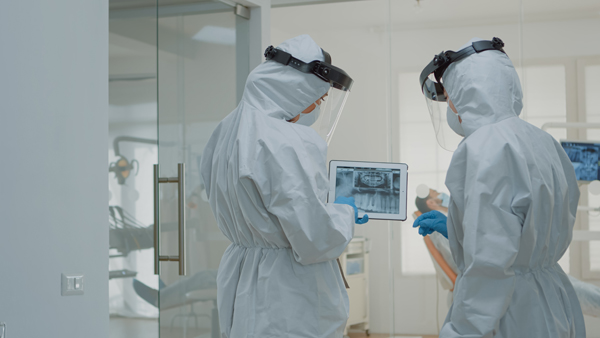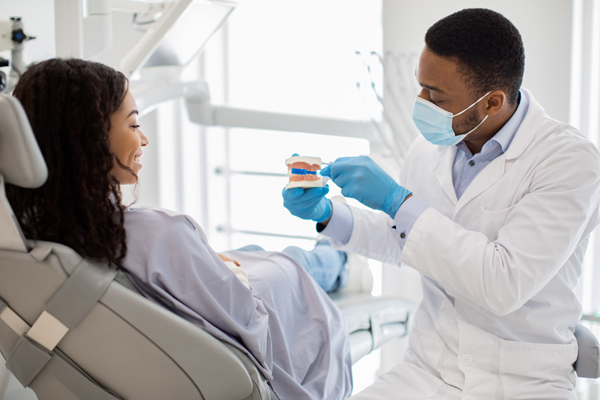Healing Time Length After a Tooth Extraction
An is usually recommended as a last resort when a tooth is too damaged to be saved. The two main types of extractions performed by dentists are simple and surgical extractions. A simple extraction is performed when enough of the tooth is left above the gumline to pull it out with forceps. A surgical extraction is recommended when the dentist needs to make an incision into the patient’s gum tissues to reach the tooth.
Recovering from tooth extraction
Extracting a tooth can be completed in as little as an hour, but the recovery process can take up to two weeks. Some of the more common reasons a dentist might recommend an extraction include:
- Severe damage: A dentist might recommend extracting teeth that have been severely damaged due to issues like tooth decay or trauma to the tooth. It is used as a last resort when the tooth cannot be saved with a dental crown
- Gum disease: A tooth might be extracted if the structures that hold it in place have been damaged by periodontal disease. A dentist might opt to extract it so that the bone structure around it can be repaired while it is replaced with an oral prosthetic
- Crowded teeth: A dentist might also recommend extracting a tooth if a patient does not have enough space on their jaw for all of their teeth or has an extra one. Creating space helps to address any other bite issues the person is dealing with
- Infection: A tooth might be extracted if infection in it threatens to spread to other parts of the body like the brain or heart, where it can have life-threatening consequences
Recovering from teeth extraction
During the procedure, local anesthetics are used, so the patient does not feel pain as their tooth is pulled out. Many patients experience some pain and discomfort once the anesthetic wears off. The pain can be managed with prescription painkillers.
Most of the bleeding from the extraction site should stop within a few hours, but there might be additional bleeding during the first 24 hours. The bleeding stops when a blood clot forms in the socket of the extracted tooth. Keeping this clot intact is one of the most critical things when recovering from an extraction.
The clot becoming dislodged leads to a painful condition called dry socket. Patients are advised not to brush or floss their teeth for the first few days after having a tooth extracted to avoid irritating the extracted tooth’s socket and the blood clot on it.
Most of the pain associated with the procedure should go away within a few days. A week after the procedure, granulation tissues should have formed over the socket, protecting the socket until new bone tissues form there.
You might be better off extracting a tooth
Extractions are typically recommended when other options are not enough to solve a patient’s problems. The extracted tooth can be replaced with oral prosthetics like implants, so you do not have to worry about your smile being ruined. Call or visit our Santa Clarita clinic to set up an appointment with our dentist.
Request an appointment here: https://perfectsmilesdentalstudio.com or call Perfect Smiles Dental Studio at (661) 551-1104 for an appointment in our Santa Clarita office.
Check out what others are saying about our dental services on Yelp: .
Recent Posts
Preparing for an upcoming tooth extraction? The main concern for patients is the potential pain that comes with the procedure. Thankfully, modern-day dentistry has allowed for new technology, which helps to keep pain at a minimum. Nonetheless, it is necessary to get familiar with what is involved in order to be appropriately prepared. Keep reading…
While a dental extraction is typically the last resort, people may not be aware of how necessary it can be on a regular basis. Perfect Smiles Dental Studio will always strive to preserve the health and beauty of your natural teeth and avoid the extraction altogether. However, we must utilize treatment methods that can save…
Oral issues that require immediate treatment are considered dental emergencies. Such problems can seems to occur at the worst moments possible, forcing someone to take time out of a busy daily schedule to safeguard their dental health and sanity.Most people do not spend much time thinking about dental emergencies until one happens to them. However,…
If you have a missing tooth, it may be difficult to eat or speak. You may not even want to be around other people. Fortunately, you do not have to struggle with this condition for long. Your dentist can talk to you about a treatment to fill in the gap and replace the tooth so…


